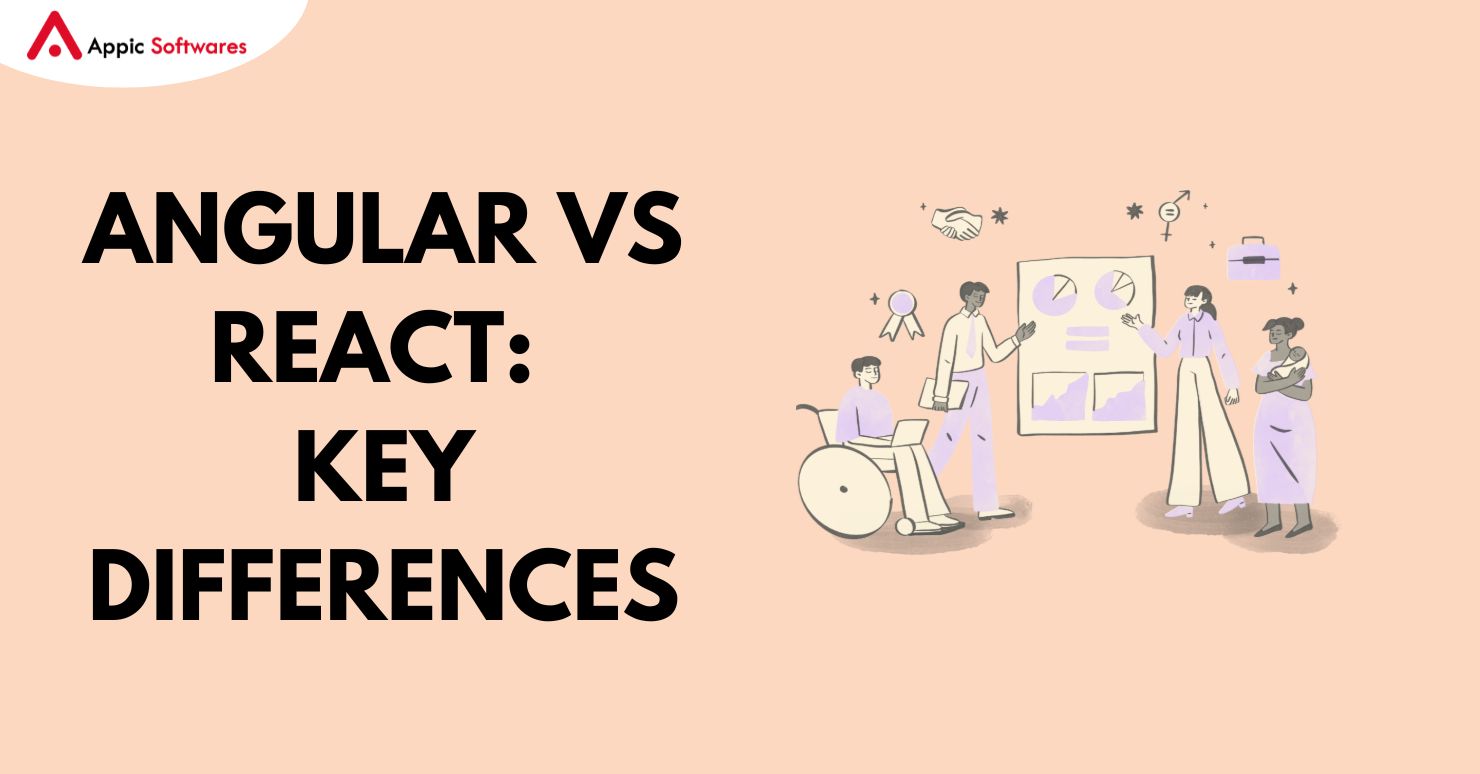
The JavaScript framework you use can greatly influence the success of your front-end development in today’s fast-paced digital landscape. React vs Angular: There is a frequent ranking as the highest among the several tools available to developers on lists of favored ones.
According to the Stack Overflow Developer Survey, React is used by 40.58% of professional developers worldwide, securing the top spot among web frameworks. Angular, while still popular, is used by 17.4%, making it more common in enterprise-level applications than in startups.
But which one better fits your project in the battle of Angular vs React?
Helping you choose which framework is better for your next project, this thorough comparison of Angular and React investigates their differences, use cases, performance measures, and project fit.

What is React?
Designed by Facebook, ReactJs is a light-weight JavaScript tool perfect for creating scalable and responsive UI. React, well-known for its virtual DOM and reusable components, gives developers the capacity to quickly create feature-rich applications.
React provides a solid basis if you want to create very successful apps that expand with your company. In fact, it’s the go-to framework for companies focusing on long-lasting mobile app growth with React Native and web scalability through React development services.
What is Angular?
Google developed and maintains the TypeScript-based front-end framework angularjs. It provides all developers need to produce dynamic, enterprise-grade apps right out-of-the-box.
The framework continues to evolve with each version, Angular 18, for example, introduces several performance and stability enhancements that make it more developer-friendly than ever.
Angular vs React: Key Differences

| Feature | AngularJS | ReactJS |
|---|---|---|
| Developed By | ||
| Framework or Library | Full-fledged framework | JavaScript library |
| Programming Language | TypeScript | JavaScript + JSX |
| DOM Type | Real DOM | Virtual DOM |
| Architecture | MVC | Component-based |
| Data Binding | Two-way data binding | One-way data binding |
| Rendering | Client-side rendering | Server-side and client-side rendering |
| Learning Curve | Steep | Moderate |
What is the Main Difference Between Angular and React?
The main difference between Angular and React lies in their purpose and scope. Angular is a complete front-end framework, offering all tools needed to build complex applications out-of-the-box. On the other hand, React is just the “V” in the MVC, it focuses only on building the view layer, making it more lightweight and flexible.
Moreover, Angular provides built-in solutions like routing, HTTP requests, and form validation. React, however, requires integrating third-party libraries to handle such functionalities, giving developers more freedom to choose their tools but also adding complexity to configuration.
Bonus read: How important is React in Pega?
React Advantages Over Angular
One of the biggest React advantages over Angular is its use of the virtual DOM, which boosts performance by minimizing updates to the actual DOM. This is especially beneficial for applications that update their user interface frequently, such as messaging apps or real-time dashboards.
React also allows for greater flexibility through its modular structure. Developers can select only the tools they need and easily integrate React with other libraries. This is in contrast to Angular’s monolithic architecture, which can sometimes feel restrictive.
Another point in favor of React is its relatively easy learning curve. Developers with experience in JavaScript can get up and running quickly with React. With Angular, the need to learn TypeScript, RxJS, and dependency injection adds more to the learning effort.
You can explore the React Native vs Swift comparison to understand why more companies are shifting to React for mobile app development.
Furthermore, if you’re considering hiring React developers, don’t miss our React Native salary guide to plan your talent acquisition strategically.
Also read: Next.Js V/S React: A Complete Comparison
ReactJS vs AngularJS: Performance and Structure
When comparing ReactJS vs AngularJS in terms of performance, React generally comes out ahead due to its efficient rendering process using the virtual DOM. React’s unidirectional data flow also contributes to better performance and debugging capabilities.
Angular’s performance can lag slightly because of its two-way data binding. Every model change triggers the view to update and vice versa, which may result in more processing overhead, especially in large applications. However, the latest versions of Angular have made significant improvements with the Ivy rendering engine, reducing the performance gap.
If you’re planning a product in industries like real estate or SaaS, both frameworks can fit depending on your needs. For example, in the PropTech SaaS development space, Angular may be used for structured workflows, while React handles dynamic UI components.
When to Use Angular and React JS?
Choosing between Angular and React JS should depend on your project’s requirements rather than trends alone. Here are some general guidelines:
Use Angular when:
- You’re building a large-scale enterprise application.
- You need an opinionated framework with a defined structure.
- Your team is experienced with TypeScript or comes from Java/C# backgrounds.
- You prefer built-in functionalities over third-party libraries.
Use React when:
- You’re building dynamic applications like dashboards or real-time tools.
- You need greater flexibility and customization.
- Your team is familiar with JavaScript, HTML, and CSS.
- You want a lightweight, fast, and scalable UI solution.
JavaScript Angular vs React: Developer Popularity
In the ongoing debate of JavaScript Angular vs React, developer preference continues to tilt in React’s favor. According to surveys like Stack Overflow and Statista, React consistently ranks among the top-used frameworks globally.
React’s large community, ease of learning, and flexibility contribute to its popularity. However, Angular still holds a strong position among enterprise teams due to its stability, TypeScript support, and comprehensive toolset.
Final Thoughts
Both Angular and React JS have proven themselves as powerful tools in modern web development. The difference between Angular and React JS boils down to your project needs, team expertise, and long-term goals.
If you’re building a large-scale enterprise app with strict architectural needs, AngularJS offers a robust framework with out-of-the-box solutions. On the other hand, if you want flexibility, faster rendering, and the freedom to use custom tools, ReactJS is the clear winner.
Ultimately, there’s no one-size-fits-all answer to the React vs Angular debate. Evaluate your requirements carefully, consider the learning curve, and think long-term.
At Appic Softwares, we specialize in crafting cutting-edge applications using both Angular and React JS. Whether you need to develop a fast MVP, scale an enterprise app, or hire dedicated developers, we’re here to help.
FAQs
Is Angular better than React?
Angular may be the better choice for enterprise-grade applications that demand structure, modularity, and built-in solutions. In contrast, React is often preferred for fast, lightweight, and interactive user interfaces, particularly in modern web and mobile development environments. If you’re still deciding based on development costs, we recommend reviewing our cost of hiring developers guide.
Why is React considered better than Angular in some cases?
It is thought to be better in some projects because of its virtual DOM, which lets writers pick the tools and libraries they need and speeds up updates. This is also helped by the fact that it is built in modules. So, React is great for making quick changes to products and making apps that change over time. You can also consider more cost-effective development strategies by exploring our developer hiring options in India.
Is React easier than Angular?
Yes, especially for coders who already know how to use JavaScript. Angular requires knowledge of TypeScript and understanding of its more opinionated structure and built-in tools. React, on the other hand, is easier to learn. Most people think that React is better for MVPs and quick development.



